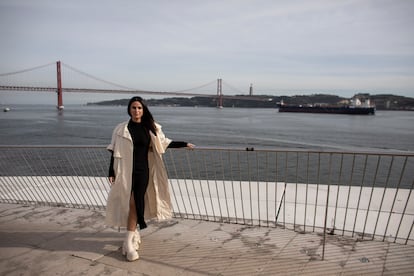Lina made an earth-shaking impact at the age of 21. After training as an opera singer, she decided that to sing as she wanted she needed poems and to close her eyes. Fado gave her what she was looking for and also a field to explore. In 2020 she released an award-winning album with Raül Refree, where she removed the omnipresent Portuguese guitar. Her new work, Fado Camoesfeatures keyboards by Massive Attack and Portishead collaborator John Baggott and a duet with Rodrigo Cuevas.
Ask. What is modern about Camões?
Answer. Her songs deal with current issues such as heartbreak and question other feelings. The structure of her poems also adapts to fado. Current things are what excite us, and if they excite you, it is because they can be current.
P. Emotions don’t change in 500 years?
R. They don’t change anything. I can cry with a Camões song because it also says things about me.
P. Are you worried that purists won’t like it? Fado Camoes?
R. Nothing. In this album, unlike the previous one where we took Amália (Rodrigues) classics and deconstructed them and there was no Portuguese guitar, here I sing traditional fados. In them you can change the texts but you keep the music and that makes it sound very familiar to the purists. Then we added modern instruments, but the role of the purists is important to remind us of the basis of everything.
P. How far can one experiment with fado?
R. It is important to know the root, but you can experiment as much as makes sense to you. It is important to have freedom, I love to sing without instruments, a cappella. An a cappella fado will be a fado. You can and should experiment.
P. She is the fado singer who best uses silence. Why does she need these spaces?
R. It gives space to feel and capture emotions, to say the words better and to give the listener time to feel them.
P. You started out in opera. Does that have anything in common with fado?
R. What I have retained is the vocal technique, I can sing without getting hoarse. My teacher asked me to open my eyes and I had to close them to feel, I realized then that fado was the style where I most recognized myself as an artist.
P. What is the difference between fado and flamenco?
R. It has to do with poetry. They share the same feelings, although I think that fado is sadder than flamenco, it is more tearful than flamenco. It can also be festive or descriptive, but what distinguishes fado from other musical styles is poetry, not only because of the rules but because of the subject matter and because it is so mystical. What is written is a story made with poetry.
P. Is fado well understood outside Portugal?
R. You don’t understand what it says, but you feel it. The important thing is that the person singing it feels what they say in order to convey the message. That’s why there are people who cry when I sing even if they don’t understand the language.
There are people who cry when I sing
P. Amália Rodrigues was the first to sing to Camões and it was considered a provocation.
R. It was in the sixties and it was considered an affront to sing to Camões, the greatest representative of the Portuguese language. Fado was a music that did not have much visibility, it was sung in fado houses and the fado singers sat with the clients so that they would consume more, it did not have a very good image. When Amália, who was very brave, sang the erudite poets, she was very badly interpreted by many purists who said that it was not fado. They are the most classical and beautiful that she has sung.
P. This year, the European Parliament passed a resolution calling on platforms such as Spotify to pay musicians a fair wage. Do you think this is unfair?
R. I can say that yes, artists receive for the streaming a percentage that is almost nothing. To earn money with music we can only do concerts, it is the only possibility.
P. You can try to change the distribution of royalties.
R. Record companies have a large percentage of royaltiesThat’s why there are so many independent musicians now. With so many possibilities on the internet, I think that’s where the future lies.

